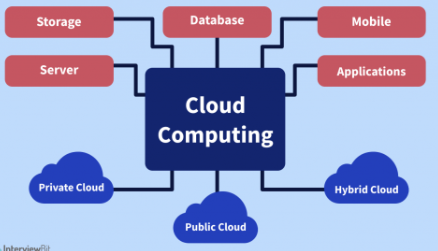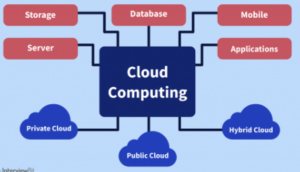Cloud computing has revolutionized the way businesses operate, offering an array of applications that enhance efficiency, scalability, and accessibility. From startups to multinational corporations, organizations are leveraging cloud technology to streamline operations, innovate products, and deliver unparalleled services. In this article, we delve into the diverse applications of cloud computing across various sectors, highlighting its transformative impact on businesses and society.
Infrastructure as a Service (IaaS) for Scalable Computing Resources
One of the primary applications of cloud computing is Infrastructure as a Service (IaaS), which provides businesses with scalable computing resources on-demand. With IaaS, companies can dynamically adjust their infrastructure to meet fluctuating demands, eliminating the need for hefty upfront investments in hardware. This scalability enables startups to rapidly prototype and scale their products without worrying about infrastructure constraints. Moreover, established enterprises can optimize their resource utilization, reducing operational costs while maintaining high performance.
Platform as a Service (PaaS) for Rapid Development and Deployment
Platform as a Service (PaaS) empowers developers with a comprehensive platform to build, deploy, and manage applications without the complexity of underlying infrastructure. By abstracting away infrastructure management, PaaS accelerates the development cycle, allowing teams to focus on innovation rather than maintenance. This agility is particularly beneficial for startups and enterprises alike, enabling them to bring new products and services to market faster. Additionally, PaaS fosters collaboration among development teams, facilitating seamless integration and continuous delivery practices.
Software as a Service (SaaS) for Accessible and Cost-effective Solutions
Software as a Service (SaaS) delivers software applications over the internet, eliminating the need for users to install, maintain, and update traditional desktop applications. SaaS providers host and manage the software centrally, offering users access via a web browser or API. This model offers unparalleled accessibility, enabling users to access applications from any device with an internet connection. Moreover, SaaS subscriptions typically follow a pay-as-you-go model, making it cost-effective for businesses of all sizes. From productivity tools to enterprise resource planning (ERP) systems, SaaS applications cater to diverse needs across industries, driving efficiency and innovation.
Big Data Analytics and Machine Learning in the Cloud
Cloud computing plays a pivotal role in enabling big data analytics and machine learning, empowering businesses to derive valuable insights from vast datasets. By leveraging cloud-based analytics platforms, organizations can process and analyze data at scale, uncovering trends, patterns, and correlations that drive informed decision-making. Furthermore, cloud-based machine learning services provide accessible frameworks for developing and deploying advanced predictive models. From personalized recommendations to predictive maintenance, machine learning algorithms deployed in the cloud enhance efficiency, accuracy, and innovation across various domains.
Internet of Things (IoT) and Edge Computing
The proliferation of Internet of Things (IoT) devices has generated unprecedented volumes of data, necessitating efficient processing and analysis at the network edge. Cloud computing, coupled with edge computing capabilities, addresses this challenge by enabling real-time data processing and decision-making closer to the data source. By distributing computing resources across the cloud and edge devices, organizations can minimize latency, enhance reliability, and optimize bandwidth utilization. This synergy between cloud and edge computing facilitates innovative IoT applications ranging from smart cities to industrial automation, unlocking new opportunities for efficiency and sustainability.
Cloud Gaming and Entertainment
Cloud computing has revolutionized the gaming and entertainment industry, ushering in a new era of on-demand gaming experiences. Cloud gaming platforms leverage powerful cloud infrastructure to stream games directly to users’ devices, eliminating the need for high-end hardware. This accessibility democratizes gaming, allowing users to play console-quality games on smartphones, tablets, or low-spec computers. Furthermore, cloud gaming platforms facilitate social gaming experiences, enabling seamless multiplayer interactions and content sharing. As the demand for immersive and accessible gaming experiences continues to rise, cloud gaming is poised to reshape the gaming landscape fundamentally.
Telemedicine and Remote Healthcare
In the healthcare sector, cloud computing facilitates telemedicine and remote healthcare services, expanding access to quality healthcare worldwide. Cloud-based telemedicine platforms enable healthcare providers to deliver virtual consultations, diagnosis, and treatment remotely, breaking down geographical barriers and improving patient outcomes. Moreover, cloud-based electronic health record (EHR) systems streamline administrative processes, enhance data interoperability, and ensure data security and privacy compliance. By harnessing the power of cloud computing, healthcare organizations can deliver cost-effective, patient-centric care while driving innovation in medical research and diagnostics.
Autonomous Vehicles and Smart Transportation
Autonomous vehicles and smart transportation systems rely on cloud computing infrastructure to enable real-time data processing, connectivity, and decision-making. Cloud-based platforms aggregate and analyze data from sensors, cameras, and GPS systems embedded in vehicles and transportation infrastructure. This data-driven approach enhances traffic management, optimizes route planning, and improves safety across road networks. Furthermore, cloud-connected autonomous vehicles leverage machine learning algorithms to enhance perception, decision-making, and navigation capabilities. As cities strive to become more sustainable and efficient, cloud-enabled smart transportation solutions offer a transformative pathway towards intelligent and connected mobility.
Conclusion
The applications of cloud computing are as diverse as they are transformative, permeating nearly every aspect of modern business and society. From scalable infrastructure to advanced analytics and immersive experiences, cloud technology continues to drive innovation, efficiency, and accessibility across industries. As businesses embrace digital transformation, the cloud serves as a catalyst for growth, enabling organizations to adapt, innovate, and thrive in an increasingly interconnected world. As we look to the future, the potential of cloud computing to reshape industries and empower individuals remains limitless, promising a world of endless possibilities and opportunities.

